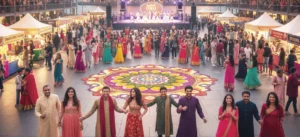Diwali in Australia: A Festival of Light, Unity, and Cultural Harmony

As the nights grow warmer and the calendar turns to spring, cities across Australia come alive with colour, light, and celebration. The air is filled with the scent of sweets, the shimmer of traditional attire, and the sounds of music and laughter. It’s Diwali — the Festival of Lights — and it’s fast becoming one of Australia’s most vibrant multicultural celebrations.
Diwali, or Deepavali, is an ancient Indian festival celebrated by millions around the world. At its heart, it symbolises the triumph of light over darkness and good over evil. Rooted in Hindu tradition, it also holds significance for Sikhs, Jains and some Buddhists.
For Hindus, Diwali commemorates the return of Lord Rama to Ayodhya after defeating the demon king Ravana. Homes are illuminated with oil lamps (diyas), prayers are offered to the goddess Lakshmi for prosperity, and families come together for feasts and festivities. For Sikhs, the festival marks the release of Guru Hargovind Ji from prison, while Jains observe it as the day Lord Mahavira attained liberation.
While the religious stories may vary, the core themes are universal: hope, renewal, generosity, and the joy of togetherness.
The Indian Australian community — one of the fastest-growing ethnic groups in the country — has played a key role in bringing Diwali into the national spotlight. With over 780,000 Australians identifying as being of Indian origin (ABS, 2021), Diwali is no longer just a community celebration. It’s a national event.
In cities like Melbourne, Sydney, Brisbane, and Perth, large-scale Diwali festivals now draw crowds in the tens of thousands. From Federation Square in Melbourne to Parramatta Park in Sydney, and King George Square in Brisbane, these public events showcase everything from Bollywood dance to Indian street food, traditional music, fashion shows, and dazzling fireworks displays.
Importantly, these festivals are open to all — and increasingly attended by Australians of all backgrounds.
Lighting the Way to Multiculturalism
In a nation that prides itself on multicultural harmony, Diwali has become more than a religious holiday — it is a symbol of how cultural traditions can enrich and unite a diverse society.
Schools across Australia now include Diwali in their multicultural programs, with students learning about its history through storytelling, arts and crafts, and food. Workplaces also embrace the occasion, with many businesses hosting Diwali-themed celebrations, encouraging cultural dress, and sharing traditional Indian sweets among staff.
Australian political leaders regularly attend Diwali functions and issue official greetings. Prime Ministers, Premiers, and local MPs have spoken at community events, underscoring the festival’s significance to the social fabric of modern Australia.
From Community Halls to City Squares
In earlier decades, Diwali in Australia was largely confined to private homes or community halls. Today, it’s celebrated in public squares, temples, schools, and even Parliament House. Cultural groups, city councils, and even mainstream Australian media now take part in promoting the festivities.
What was once a diaspora tradition has become a fixture in Australia’s multicultural calendar, joining events like Lunar New Year and NAIDOC Week in celebrating the diversity that defines the nation.
Bridging Generations and Cultures
For many young Indian Australians, Diwali serves as an important link to their heritage. It offers a way to connect with their roots, even as they navigate life in a Western society.
At the same time, it’s a platform for sharing culture with peers. Young Australians from all backgrounds are now experiencing Diwali — not as spectators, but as participants. Whether through school celebrations, attending festivals, or joining in at a friend’s home, Diwali is fast becoming part of the shared cultural experience in Australia.
While the rise of Diwali is a testament to Australia’s inclusive spirit, the Indian community continues to balance the challenges of cultural preservation and assimilation. There are concerns about the festival becoming overly commercialised or losing its spiritual roots in the process of mainstream celebration.
Yet, many see this as an opportunity — a chance to educate and share deeper values behind the lights and festivities, and to encourage reflection alongside celebration.
As Australia continues to grow and diversify, Diwali offers more than just colourful celebrations — it offers a model for inclusion. It shows how a festival rooted in ancient tradition can thrive in modern society, not just by preserving culture, but by inviting others to celebrate alongside.
In a world often divided by difference, Diwali reminds us of the power of unity, generosity, and hope. It lights not just homes, but hearts — across communities, generations, and borders.

